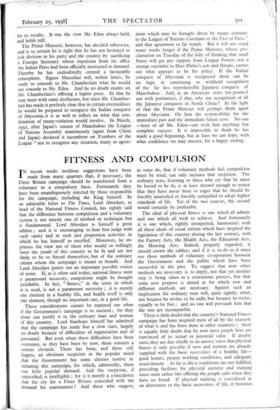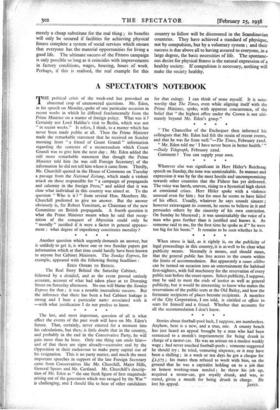FITNESS AND COMPULSION I N recent weeks insidious suggestions have been
I made from many quarters that, if necessary, the Fitter Britain campaign should be transferred from a voluntary to a compulsory basis. Fortunately they have been unambiguously rejected by those responsible for the campaign, including the King himself. In an admirable letter to The Times, Lord Aberdare, as head of the National Fitness Council, has rightly said that the difference between compulsion and a voluntary system is not merely one of method or technique but is fundamental. Lord Aberdare is himself a great athlete ; and it is encouraging to hear him judge with such sanity and in such just proportion activities in which he has himself so excelled. Moreover, he ex- presses the view not of those who would so willingly force the youth of this country to be fit and are not likely to be so forced themselves, but of the ordinary citizen whom the campaign is meant to benefit. And Lord Aberdare points out an important possible source of error. If, as is often said today, national fitness were a paramount necessity, compulsion might be thought justifiable. In fact, " fitness," in the sense in which it is used, is not a paramount necessity ; it is merely one element in a healthy life, and health itself is only one element, though an important one, in a good life.
These considerations cannot be repeated too often if the Government's campaign is to succeed ; for they alone can justify it to the ordinary man and woman of this country. Lord Stanhope himself has admitted that the campaign has made but a slow start, largely no doubt because of difficulties of organisation and of personnel. But even when these difficulties have been overcome, as they have been by now, there remains a serious obstacle. There has been, and there still lingers, an obstinate suspicion in the popular mind that the Government has some ulterior motive in initiating this campaign, for which, admittedly, there was little popular demand. And the suspicion, if unjustified, is intelligible ; for is it merely a coincidence that the cry for a Fitter Britain coincided with the demand for rearmament ? And those who suggest, as some do, that if voluntary methods fail, compulsion must be tried, can only increase that suspicion. The ordinary man, listening to those who cry that he must be forced to be fit, is at least shrewd enough to notice that they have never been so eager that he should be forcibly nourished or forcibly compelled to adopt higher standards of life. Yet of the two courses, the second would certainly be preferable.
The ideal of physical fitness is one which all admire and one which all wish to achieve. And fortunately it is one which, rightly interpreted, harmonises with all those ideals of social reform which have inspired the legislation of this country during the last century, with the Factory Acts, the Health Acts, the Education Acts, the Housing Acts. Indeed, properly regarded, it should crown the edifice; and if it is to do so, it must use those methods of voluntary co-operation between the Government and the public which have been successful in the past. To suggest that now other methods are necessary is to imply, not that yet another step is being taken in a continuous process, but that some new purpose is aimed at for which new and different methods are necessary. Against such an implication the ordinary man will, quite rightly, rebel, not because he wishes to be unfit, but because he wishes equally to be free ; and no one will persuade him that the two are incompatible.
There is little doubt that this country's National Fitness campaign has been inspired most of all by the example of what is and has been done in other countries ; there is equally little doubt that by now most people here are convinced of its actual or potential value. If doubts exist, they are due chiefly to an uneasy sense that physical fitness is only possible if men and women are already supplied with the basic necessities of a healthy life— good homes, proper working conditions, and adequate nourishment. So far as these conditions are not fulfilled, providing facilities for physical exercise and training must seem rather like offering the people cake when they have no bread. If physical training is considered as an alternative to the basic necessities of life, it becomes merely a cheap substitute for the real thing ; its benefits will only be secured if facilities for achieving physical fitness complete a system of social services which ensure that everyone has the material opportunities for living a good life. The ultimate success of the Fitness campaign is only possible so long as it coincides with improvements in factory conditions, wages, housing, hours of work. Perhaps, if this is realised, the real example for this country to follow will be discovered in the Scandinavian countries. They have achieved a standard of physique, not by compulsion, but by a voluntary system ; and their success is due above all to having assured to everyone, in a large degree, the basic necessities of life. The spontane- ous desire for physical fitness is the natural expression of a healthy society. If compulsion is necessary, nothing will make the society healthy.

















































 Previous page
Previous page